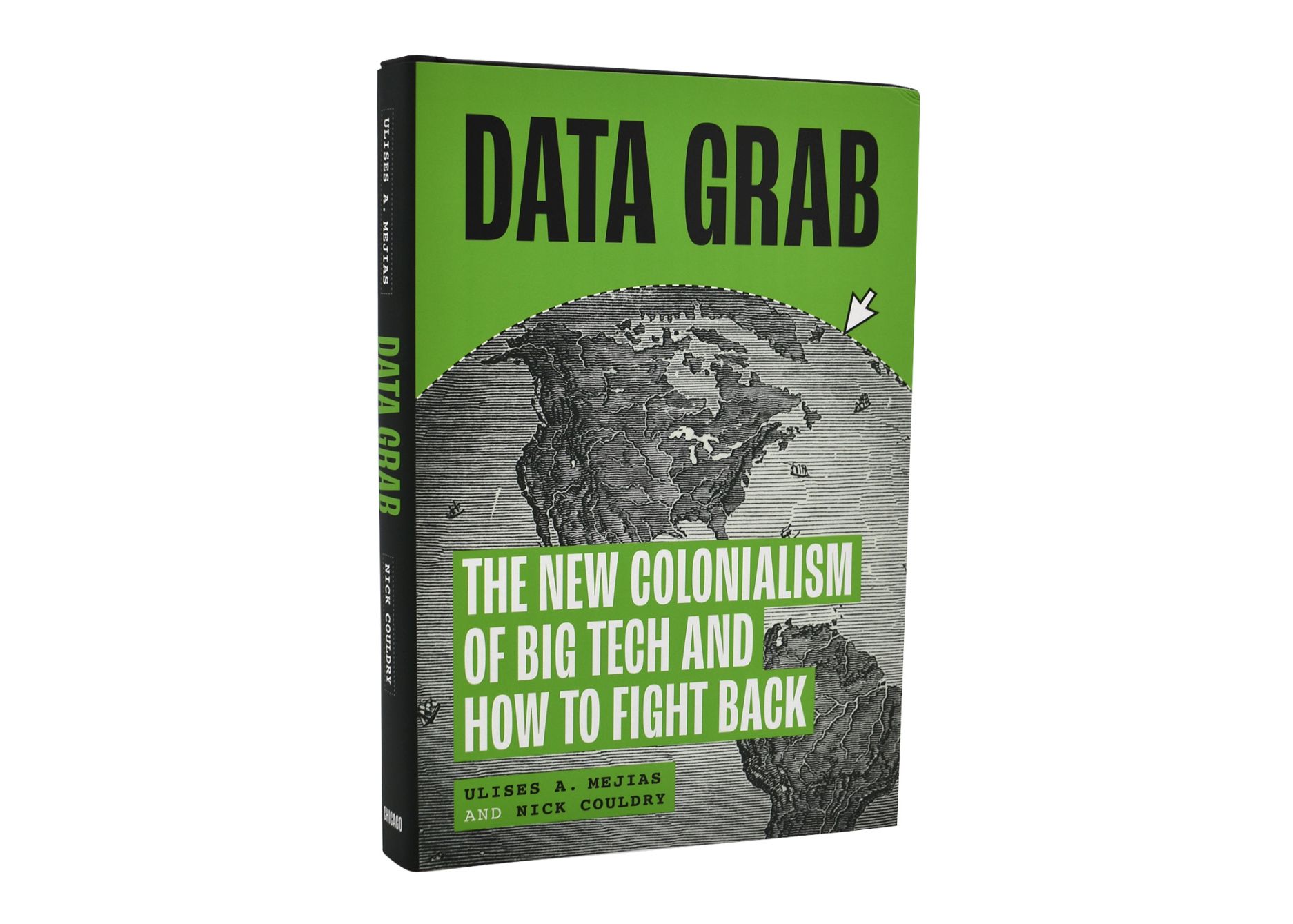Data Grab
The New Colonialism of Big Tech and How to Fight Back
A compelling argument that the extractive practices of today’s tech giants are the continuation of colonialism—and a crucial guide to collective resistance.
Large technology companies like Meta, Amazon, and Alphabet have unprecedented access to our daily lives, collecting information when we check our email, count our steps, shop online, and commute to and from work. Current events are concerning—both the changing owners (and names) of billion-dollar tech companies and regulatory concerns about artificial intelligence underscore the sweeping nature of Big Tech’s surveillance and the influence such companies hold over the people who use their apps and platforms.
As trusted tech experts Ulises A. Mejias and Nick Couldry show in this eye-opening and convincing book, this vast accumulation of data is not the accidental stockpile of a fast-growing industry. Just as nations stole territories for ill-gotten minerals and crops, wealth, and dominance, tech companies steal personal data important to our lives. It’s only within the framework of colonialism, Mejias and Couldry argue, that we can comprehend the full scope of this heist.
Like the land grabs of the past, today’s data grab converts our data into raw material for the generation of corporate profit against our own interests. Like historical colonialism, today’s tech corporations have engineered an extractive form of doing business that builds a new social and economic order, leads to job precarity, and degrades the environment. These methods deepen global inequality, consolidating corporate wealth in the Global North and engineering discriminatory algorithms. Promising convenience, connection, and scientific progress, tech companies enrich themselves by encouraging us to relinquish details about our personal interactions, our taste in movies or music, and even our health and medical records. Do we have any other choice?
Data Grab affirms that we do. To defy this new form of colonialism we will need to learn from previous forms of resistance and work together to imagine entirely new ones. Mejias and Couldry share the stories of voters, workers, activists, and marginalized communities who have successfully opposed unscrupulous tech practices. An incisive discussion of the digital media that’s transformed our world, Data Grab is a must-read for anyone concerned about privacy, self-determination, and justice in the internet age.
Large technology companies like Meta, Amazon, and Alphabet have unprecedented access to our daily lives, collecting information when we check our email, count our steps, shop online, and commute to and from work. Current events are concerning—both the changing owners (and names) of billion-dollar tech companies and regulatory concerns about artificial intelligence underscore the sweeping nature of Big Tech’s surveillance and the influence such companies hold over the people who use their apps and platforms.
As trusted tech experts Ulises A. Mejias and Nick Couldry show in this eye-opening and convincing book, this vast accumulation of data is not the accidental stockpile of a fast-growing industry. Just as nations stole territories for ill-gotten minerals and crops, wealth, and dominance, tech companies steal personal data important to our lives. It’s only within the framework of colonialism, Mejias and Couldry argue, that we can comprehend the full scope of this heist.
Like the land grabs of the past, today’s data grab converts our data into raw material for the generation of corporate profit against our own interests. Like historical colonialism, today’s tech corporations have engineered an extractive form of doing business that builds a new social and economic order, leads to job precarity, and degrades the environment. These methods deepen global inequality, consolidating corporate wealth in the Global North and engineering discriminatory algorithms. Promising convenience, connection, and scientific progress, tech companies enrich themselves by encouraging us to relinquish details about our personal interactions, our taste in movies or music, and even our health and medical records. Do we have any other choice?
Data Grab affirms that we do. To defy this new form of colonialism we will need to learn from previous forms of resistance and work together to imagine entirely new ones. Mejias and Couldry share the stories of voters, workers, activists, and marginalized communities who have successfully opposed unscrupulous tech practices. An incisive discussion of the digital media that’s transformed our world, Data Grab is a must-read for anyone concerned about privacy, self-determination, and justice in the internet age.
Reviews
Table of Contents
Acknowledgements
Introduction: From Landgrab to Data Grab
The Four X’s of Colonialism
Terms and Conditions
Raw Materials
Reading the Present through a Colonial Lens
Your Guide to the Book
1. A New Colonialism
No Capitalism without Colonialism
Data and the Continuation of Colonial Violence by Other Means
The Colonial Roots of AI
The Resilience of Colonialism
We Need Not Be Passive Victims
2. Data Territories
When Society Becomes the Territory
New Data Relations Mean New Power Relations
Data, AI and the Environment 76
There’s a Data Grab Happening (Very) Near You
Data Territories and the Transformation of Work
Global Inequality, Redux
3. Data’s New Civilising Mission
The Emperor’s New ‘Civilising’ Clothes
Civilising Narrative #1: Everyone Wants an Easier Life (aka Data Extraction as Convenience)
Civilising Narrative #2: This Is How We Connect!
Civilising Narrative #3: AI Is Smarter than Humans
Why Civilisational Stories Work
4. The New Colonial Class
The Social Quantification Sector
The Big Data Harvesters
The Wider Colonial Class
Serving the Algorithmic State
Data’s Lone Adventurers
We the Consumers
5. Voices of Defiance
Colonialism’s Witnesses
No Modernity without Colonialism
Warnings from an Earlier Computer Age
Imagining the Battle to Come
Resources for Resistance?
6. A Playbook for Resistance
Resistance Is Already Here, and Nothing Can Stop It
Radically Reimagining How We Use Data
Introducing the Playbook
Play #1: Working within the System
Play #2: Working against the System
Play #3: Working beyond the System
Conclusion: And If We Don’t Resist?
Notes
Further Reading Suggestions
Index
Introduction: From Landgrab to Data Grab
The Four X’s of Colonialism
Terms and Conditions
Raw Materials
Reading the Present through a Colonial Lens
Your Guide to the Book
1. A New Colonialism
No Capitalism without Colonialism
Data and the Continuation of Colonial Violence by Other Means
The Colonial Roots of AI
The Resilience of Colonialism
We Need Not Be Passive Victims
2. Data Territories
When Society Becomes the Territory
New Data Relations Mean New Power Relations
Data, AI and the Environment 76
There’s a Data Grab Happening (Very) Near You
Data Territories and the Transformation of Work
Global Inequality, Redux
3. Data’s New Civilising Mission
The Emperor’s New ‘Civilising’ Clothes
Civilising Narrative #1: Everyone Wants an Easier Life (aka Data Extraction as Convenience)
Civilising Narrative #2: This Is How We Connect!
Civilising Narrative #3: AI Is Smarter than Humans
Why Civilisational Stories Work
4. The New Colonial Class
The Social Quantification Sector
The Big Data Harvesters
The Wider Colonial Class
Serving the Algorithmic State
Data’s Lone Adventurers
We the Consumers
5. Voices of Defiance
Colonialism’s Witnesses
No Modernity without Colonialism
Warnings from an Earlier Computer Age
Imagining the Battle to Come
Resources for Resistance?
6. A Playbook for Resistance
Resistance Is Already Here, and Nothing Can Stop It
Radically Reimagining How We Use Data
Introducing the Playbook
Play #1: Working within the System
Play #2: Working against the System
Play #3: Working beyond the System
Conclusion: And If We Don’t Resist?
Notes
Further Reading Suggestions
Index



